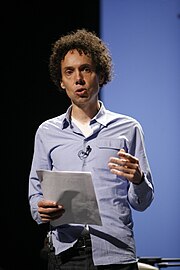Malcolm Gladwell
Malcolm Gladwell | |
|---|---|
 | |
| Occupation | Non-fiction writer, journalist |
| Nationality | Canadian |
| Period | 1987–present |
| Notable works | The Tipping Point (2000) Blink (2005) Outliers (2008) |
Malcolm Gladwell (born September 3, 1963) is a British-born Canadian journalist, author, and pop sociologist,[1] based in New York City. He has been a staff writer for The New Yorker since 1996. He is best known as the author of the books The Tipping Point (2000), Blink (2005), and Outliers (2008).
Early life
Gladwell's English father, Graham, is a civil engineering professor at the University of Waterloo; his mother, Joyce, is a Jamaican-born psychotherapist. Gladwell has said that his mother, who published a book titled Brown Face, Big Master in 1969, is his role model as a writer.[2] Though born in the United Kingdom, Gladwell was raised in Elmira, Ontario, Canada and graduated with a degree in history from the University of Toronto's Trinity College in 1984.[3] During his high school years, Gladwell was an outstanding middle distance runner and won the 1500m Midget Boys title at the 1978 Ontario High School championships in Kingston, Ontario, in a duel with eventual Canadian Open record holder David Reid.[4]
Career
Gladwell began his career at The American Spectator, a conservative monthly.[5] From 1987 to 1996, he was a science writer—and later the New York bureau chief—for The Washington Post. He is currently a staff writer for The New Yorker. His books—The Tipping Point (2000) and Blink (2005)—were international bestsellers. Both works were substantially serialized in The New Yorker. Gladwell received a one million dollar advance for The Tipping Point, which went on to sell over two million copies in the United States.[6][7] Blink sold equally well.[6][8] His latest book, Outliers: The Story of Success, was released on November 18, 2008.[9]
Works
Gladwell's books and articles often deal with the unexpected implications of research in the social sciences and make frequent and extended use of academic work, particularly in the areas of sociology, psychology, and social psychology. He has, however received criticism from academics for his sampling methods, as well as his tendency to imply causation between events where only correlation exists. [10]
Gladwell's first work, The Tipping Point, discusses the potentially massive implications of small-scale social events, while his second book, Blink, explains how the human subconscious interprets events or cues and how past experiences allow people to make informed decisions very rapidly. His latest work, Outliers, examines how a person's environment affects his or her possibility and opportunity for success. Gladwell has stated, "The hope with Tipping Point was it would help the reader understand that real change was possible. With Blink, I wanted to get people to take the enormous power of their intuition seriously. My wish with Outliers is that it makes us understand how much of a group project success is. When outliers become outliers it is not just because of their own efforts. It's because of the contributions of lots of different people and lots of different circumstances".[11]
Honors
In 2005, Time named Malcolm Gladwell one of its 100 most influential people. He is the author of three books, each of which reached number one on the New York Times Best Seller list.[12] In 2007, he received the American Sociological Association's first Award for Excellence in the Reporting of Social Issues.[13] Also in 2007, Gladwell received an honorary Doctor of Letters degree from the University of Waterloo.[14][15]
Bibliography
- The Tipping Point (2000)
- Blink (2005)
- Outliers (2008)
References
- ^ Colvile, Robert (2008-12-17). "Outliers by Malcolm Gladwell - review". The Daily Telegraph. Retrieved 2009-01-17.
- ^ "A conversation with Malcolm Gladwell". Charlie Rose. 2008-12-19. Retrieved 2009-01-17.
- ^ "Books by Malcolm Gladwell". Biblio. Retrieved 2009-01-17.
- ^ "Race". Radiolab. 2008-11-28. Retrieved 2009-01-17.
- ^ Zengerle, Jason (2008-11-09). "Geek Pop Star". New York Magazine. Retrieved 2009-01-17.
- ^ a b Donadio, Rachel (2006-02-05). "The Gladwell Effect". The New York Times. Retrieved 2009-01-17.
- ^ McNett, Gavin (2000-03-17). "Idea epidemics". Salon.com. Retrieved 2009-01-17.
- ^ "Gladwell: 'I was an outsider many times over'". Times Online. June 2009.
- ^ "Outliers: The Story of Success (Hardcover)". Amazon.com. Retrieved 2009-01-17.
- ^ "What is Malcolm Gladwell talking about?". The New Republic. Retrieved 2009-08-04.
- ^ "What is Outliers about?". Malcolm Gladwell. Retrieved 2009-01-17.
- ^ "Biography". Malcolm Gladwell. Retrieved 2009-01-17.
- ^ "Malcolm Gladwell Award Statement". American Sociological Association. 2007-03-16. Retrieved 2009-01-17.
- ^ "UW awards 17 honorary degrees at spring convocation". University of Waterloo. 2007-05-02. Retrieved 2009-01-17.
- ^ Davis, Brent; O'Reilly, Nicole (2007-06-15). "Another feather in their cap". The Record. Retrieved 2009-01-17.
{{cite web}}: CS1 maint: multiple names: authors list (link)
External links
- Canadian expatriate journalists in the United States
- Canadian expatriate writers in the United States
- New Yorker staff writers
- American Spectator people
- Business speakers
- Canadians of English descent
- Canadians of Jamaican descent
- People from Waterloo Region, Ontario
- 1963 births
- Living people
- Trinity College (Canada) alumni
- Black Canadian writers
- Canadian non-fiction writers
- Social sciences writers
